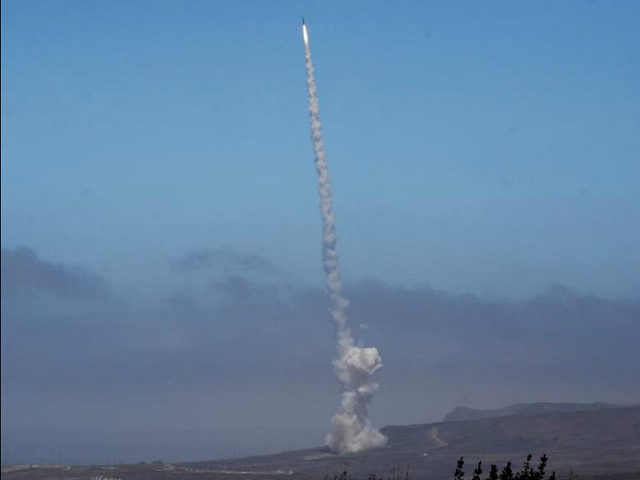A group of 25 Republican House lawmakers, joined by one Democrat, have sent a letter urging President Donald Trump to significantly increase funding to various programs aimed at developing an earth- and space-based “robust missile defense architecture” capable of protecting the U.S. homeland against “any threat from any nation,” not just Iran and North Korea.
The letter, sent to the commander-in-chief on February 3, notes:
By increasing funding to our resource-starved directed energy programs, the Trump Administration has the opportunity to complete what the Reagan Administration began and allow the United States to “leapfrog” the missile threat. By deploying multi-mission space sensors, we will be able to accurately identify and target the newest and most advanced missile defense architecture and further protect our homeland from the Iranian missile threat. This is also a great opportunity to accelerate the Multi-Object Kill Vehicle (MOKV) program, which will ensure we are able to protect against the most advanced enemy warheads which are capable of deploying extremely effective decoys, and the new Ground-Based Interceptors with Configuration 3 (C3) booster which will be required to adequately counter the newest missiles.
[…]
Once the technology is mastered, the concrete poured, and the satellites deployed, the architecture is there to stay, regardless of which party controls Congress and the White House.
A mandate in the 2017 National Defense and Authorization Act (NDAA), signed into law last year, calls for a “historic” shift in the U.S. missile defense system, points out the letter.
Instead of only guarding against a “limited” threat, it is now U.S. policy to “maintain and improve an effective, robust, layered missile defense system capable of defending the territory of the United States, allies, deployed forces, and capabilities against the developing and increasingly complex ballistic missile threat,” according to the law.
Lawmakers urge the president to take advantage of the provision.
Rep. Trent Franks (R-AZ), one of the letter’s co-authors and co-chair of the Congressional Missile Defense Caucus, explained in a statement:
Iran’s missile test on Sunday reinforces just how serious and growing is the threat from ballistic missiles. President Trump has a tremendous opportunity to rapidly advance our missile defense system. The FY17 NDAA completely changed our nation’s missile defense policy from a “limited” defense to a “robust” defense, capable of defeating evolving threats. After underfunding our missile defense budget for eight years under the Obama Administration, our near-peer competitors are rapidly developing ballistic missile capabilities aimed at exploiting the gaps and seams in our missile defense architecture.
The February 3 letter comes after Iran recently fire-tested ballistic missiles despite a United Nations resolution barring the Islamic Republican from doing so.
Various top Iranian officials have struck a defiant tone against sharp rebukes issued by the Trump administration in response to the tests.
Congresswoman Tulsi Gabbard, a U.S. military combat veteran from Hawaii who serves as a member of the House Armed Services Committee and co-chair of the missile defense caucus, is the only Democrat to sign the correspondence.
Although he did not sign the letter, Mac Thornberry (R-TX), chairman of the House armed services panel, expressed support Monday for expanding America’s missile defense system, telling reporters, “If you look at what’s happening around the world, I would mention Iran and North Korea, the importance of missile defense is increasing.”
Within minutes of President Trump’s inauguration, the White House revealed its intention to “develop a state-of-the-art missile defense system to protect against missile-based attacks from states like Iran and North Korea.”
Echoing other analysts last week, John McLaughlin, a former deputy and acting director of the CIA, told members of the House Armed Services Committee, that North Korea “probably presents the most pressing near-term” threat against the U.S., noting that the communist country is “now clearly within reach” of a nuclear intercontinental ballistic missile (ICBM) able to reach U.S. soil.
Rep. Duncan Hunter (R-CA) also signed the February 3 letter to Trump and wrote a complementary one of his own, urging the president to establish a permanent missile defense system in Kuwait to protect against a missile attack from Iran.
The congressman, a military combat veteran who also serves on the House armed services panel, wrote:
As a result of Iran’s continued provocations, it is my recommendation that you immediately consider permanently placing a ballistic missile defense system in Kuwait. I was recently made aware, by a highly regarded Senior Fellow at Los Alamos National Laboratory, that planning for a contingency currently exists. And taking this approach would serve as both a deterrent to Iran and protection for our critical allies in the region.
Iran has repeatedly threatened to strike U.S.-ally Israel, which the Islamic Republican has failed to recognize.

COMMENTS
Please let us know if you're having issues with commenting.